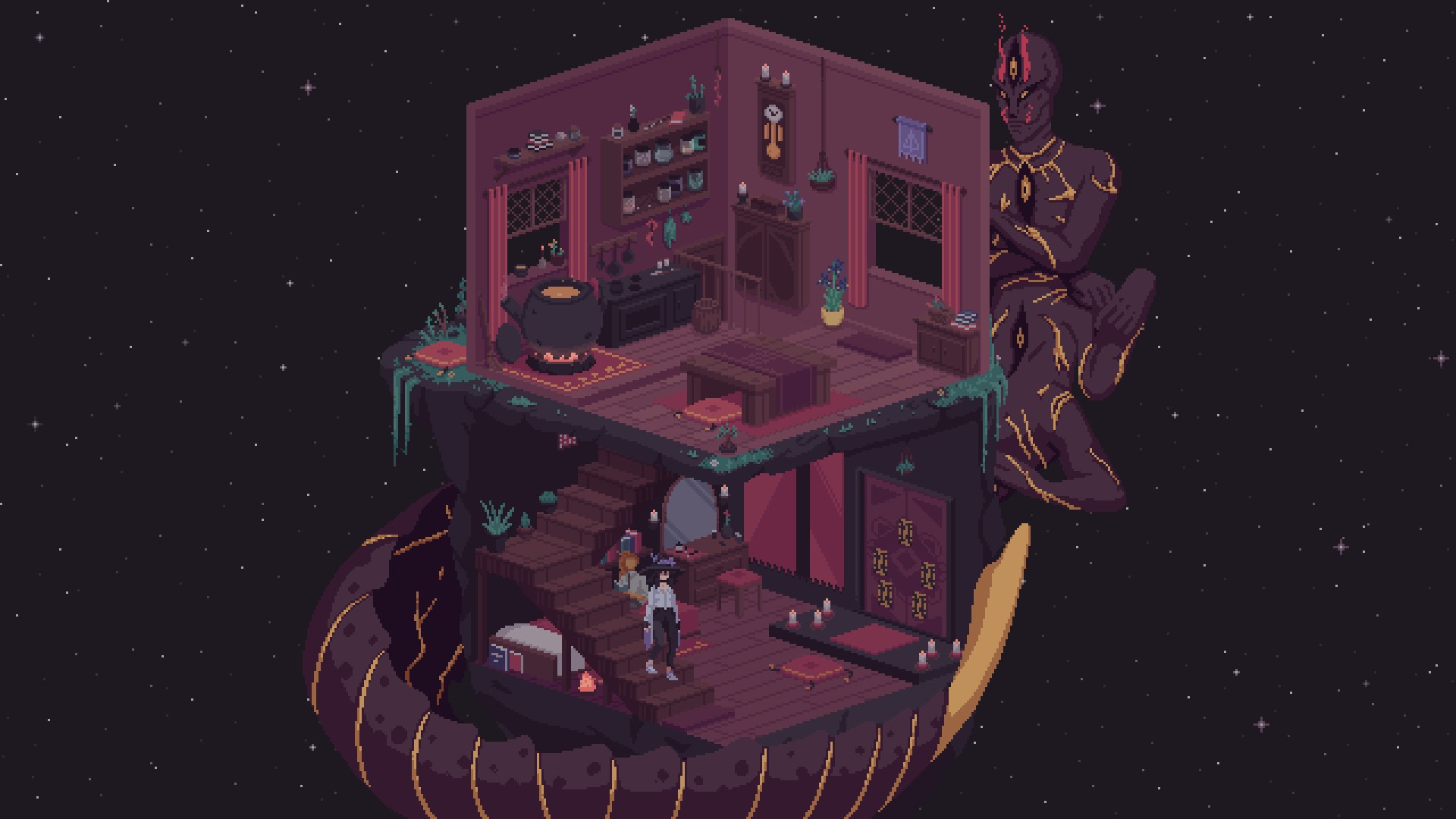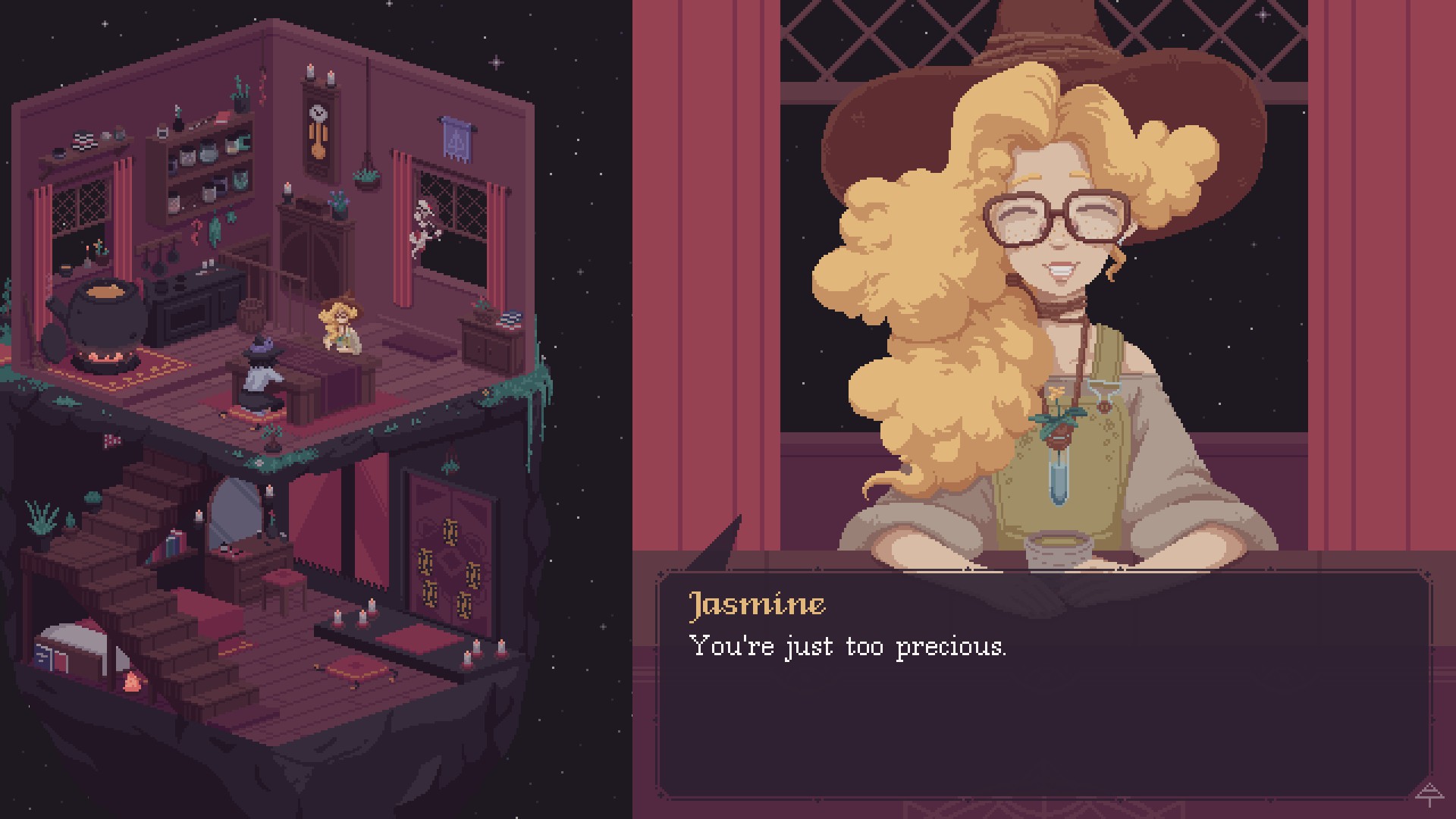
What does it actually mean to be given a choice in a video game? Is it a whimsical little diversion to give us a sense of agency and urgency, or is something potentially far more sinister, letting the player overstep moral and ethical boundaries to impose their will on characters that can't fight back? The Cosmic Wheel Sisterhood posits that choices are the latter. The latest narrative-led visual novel by Deconstructeam plays out as a Tarot deck-building adventure, where we play a witch called Fortuna, sealed away by her spacefaring coven on an asteroid and left to rot for a millennium for nefarious reasons.
Release date: August 16, 2023
Platform(s): PC, Nintendo Switch
Developer: Deconstructeam
Publisher: Devolver Digital
Deconstructeam's latest wrestles with what it means to be given choices in interactive media. The Cosmic Wheel Sisterhood asks that, if a character bends their will to the choices of the player, do they really have free will? Should you, the player, really be giving out advice to characters if it means shaping their destiny and forcing them down pathways they otherwise wouldn't venture down?
I've never quite seen a game tackle player choice and interaction in such a fascinating way. It's to Deconstructeam's credit that the whole thing never feels like a lecture, like the developer is wagging its finger at you, but instead asking meaningful questions about the ways in which we engage with characters and the ethical responsibilities we have in interactive media.
All in the cards

The Cosmic Wheel Sisterhood's foundations are a deck-building Tarot card game. You're given resources of fire, water, earth, and air, which you can take downstairs to Fortuna's basement (of sorts) and craft cards built around feelings, like loss, resentment, anger, hopelessness, and even more to create a smorgasbord of emotions.
You'll use these cards to provide answers to the problems Fortuna's friends are posed with. One four-armed witch is afraid of revealing her true identity to her human lover, for example, and Fortuna's cards can help advise her the best course of action. The more cards you create from accumulated energy, the more you open your options for advice in branching narrative pathways for friends – a clever way of tying in The Cosmic Wheel Sisterhood's gameplay "mechanics" of sorts to its stories.
Not a word is wasted over the entire adventure. Deconstructeam's writing is, in a word, peerless, the sort of text that breathes life into characters you've only just met after a few minutes. Every sentence is bristling with character and purpose, every conversation a memorable interaction with potentially life-changing ramifications around the cosmos themselves.
This is all to say nothing of The Cosmic Wheel Sisterhood's final hours, which take a left turn and almost pivot to a new sort of experience entirely. The change is Earth-shattering for our characters, but it's handled with grace and expertise by Deconstructeam, as The Cosmic Wheel Sisterhood hurtles towards its final hour of reckoning that left my heart beating out of my chest and my eyes unblinking for an unhealthy period.
Higher powers

The Cosmic Wheel Sisterhood is extremely high concept, but takes root in very human feelings, and mature ones at that. As Fortuna, you can lean into the self-harm aspect of having been sealed away for hundreds of years in a small house on an asteroid, but there's never any shame for admitting to other characters that you burned parts of your body just to feel something in isolation, or tried to end it all but physically couldn't as an immortal witch.
This is a decidedly post-human adventure, but it never loses its sense of humanity despite this. All the witches in Fortuna's former coven ascended from humanity to become something ethereal out in space, and Deconstructeam brilliantly leans into this post-humanisation to explore topics like transgender women transitioning without the societal pressures and everyday norms that we're used to.
There's a brief scene where a transgender woman ascends to the Sisterhood, for example, and Fortuna encounters her as she tries to get accustomed to life after Earth. The Cosmic Wheel Sisterhood's writing never deadnames this woman, or provides any detail about her past life, but instead looks forward with hope for her, focusing exclusively on her future and how she can be anyone she wants to be when separated from a society that isn't trying to actively punish her.
Into the cosmos

There's sublime world building in The Cosmic Wheel Sisterhood, itself a herculean feat considering 99% of the game takes place in Fortuna's home. Fortuna's friends are chomping at the bit to see her after 200 years of isolation, and with every visit comes news of how the Sisterhood has fared after her departure. Every conversation brilliantly folds in details about not just the wider world, but our place within it.
What's the coven leader, Aedana, been up to since she ordered Fortuna's imprisonment? How does the sisterhood help guide women who ascend from Earth to become witches? It feels like The Cosmic Wheel Sisterhood packs in a novel's worth of world-building into just six or so hours, and it's nothing short of a miracle that the whole thing never feels like one big exposition dump, but a gradual expansion behind the horizons of Fortuna's four walls.
"The Cosmic Wheel Sisterhood is nothing short of superb, the sort of game that demands to be experienced as soon as possible"
The Cosmic Wheel Sisterhood's sumptuous soundtrack works wonders for giving it a striking personality. 'Lo-Fi beats to chill to in outer space' would honestly be a pretty accurate descriptor of its soundtrack, but also underselling it for how it builds and shifts with each character. The easygoing Jasmine has a more tender, gentle track underscoring her appearance, for example, while the more fiery, ferocious leader of the warrior witches, Dahlia, is accompanied by a punchier, livelier beat.
The Cosmic Wheel Sisterhood is nothing short of superb, the sort of game that demands to be experienced as soon as possible. Deconstructeam is masterfully taking subjects like post-humanism and player choice and breathing new life into them, providing a new way for its audience to look at topics. The writing and narrative works on display here are utterly brilliant and superbly compelling, all forming what is, without a doubt, one of the richest visual novel experiences of the past few years.







